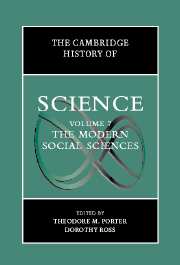Book contents
- Frontmatter
- 1 Introduction: Writing the History of Social Science
- PART I SCIENCES OF THE SOCIAL TO THE LATE NINETEENTH CENTURY
- PART II THE DISCIPLINES IN WESTERN EUROPE AND NORTH AMERICA SINCE ABOUT 1880
- PART III THE INTERNATIONALIZATION OF THE SOCIAL SCIENCES
- PART IV SOCIAL SCIENCE AS DISCOURSE AND PRACTICE IN PUBLIC AND PRIVATE LIFE
- 30 The Uses of the Social Sciences
- 31 Managing the Economy
- 32 Management and Accounting
- 33 Polling in Politics and Industry
- 34 Social Science and Social Planning During the Twentieth Century
- 35 Social Welfare
- 36 Education
- 37 The Culture of Intelligence
- 38 Psychologism and the Child
- 39 Psychiatry
- 40 Gender
- 41 Race and The Social Sciences
- 42 Cultural Relativism
- 43 Modernization
- Index
- References
38 - Psychologism and the Child
from PART IV - SOCIAL SCIENCE AS DISCOURSE AND PRACTICE IN PUBLIC AND PRIVATE LIFE
Published online by Cambridge University Press: 28 March 2008
- Frontmatter
- 1 Introduction: Writing the History of Social Science
- PART I SCIENCES OF THE SOCIAL TO THE LATE NINETEENTH CENTURY
- PART II THE DISCIPLINES IN WESTERN EUROPE AND NORTH AMERICA SINCE ABOUT 1880
- PART III THE INTERNATIONALIZATION OF THE SOCIAL SCIENCES
- PART IV SOCIAL SCIENCE AS DISCOURSE AND PRACTICE IN PUBLIC AND PRIVATE LIFE
- 30 The Uses of the Social Sciences
- 31 Managing the Economy
- 32 Management and Accounting
- 33 Polling in Politics and Industry
- 34 Social Science and Social Planning During the Twentieth Century
- 35 Social Welfare
- 36 Education
- 37 The Culture of Intelligence
- 38 Psychologism and the Child
- 39 Psychiatry
- 40 Gender
- 41 Race and The Social Sciences
- 42 Cultural Relativism
- 43 Modernization
- Index
- References
Summary
Psychologism is an elusive phenomenon in modern Western culture, located everywhere and nowhere, meaning everything and nothing at all. It refers to the discursive practice of using psychological explanations to make sense of individual and collective experience, and especially to link the two together. Because this explanatory resource is located in the slippery space between academic social science, clinical professionalism in psychology and medicine, and popular culture, psychologism is not fully at home in either the history of science or intellectual history. It has nevertheless often elicited sweeping cultural interpretations.
Psychologism was initially championed by psychological professionals and their enterprising partners in Progressive Era reform before World War I. During this early phase, it was linked to the administration of subjectivity by means of normalizing technologies – standardized tests given to individuals by schools or by the military, for instance. More than a handy toolbox for the managers of mass society, psychological discursive practices were imported into individual projects of self-fashioning. By 1945, they had migrated to popular audiences who began as objects but soon became avid consumers of disciplinary knowledges and practices, inspiring individuals to embrace the varieties of therapeutic experience as the surest path to mental well-being and happiness.
Among the many American figures who promoted a psychological world-view were the Progressives Henry Herbert Goddard and William Healy. At midcentury, professional experts Margaret Mead and Benjamin Spock achieved the status of cultural icons. At the end of the century, Oprah Winfrey was psychologism’s most visible proponent, and her massive and enthusiastic audience indicated how thoroughly the therapeutic sensibility had trickled down to the grass roots.
- Type
- Chapter
- Information
- The Cambridge History of Science , pp. 649 - 662Publisher: Cambridge University PressPrint publication year: 2003
References
- 7
- Cited by



